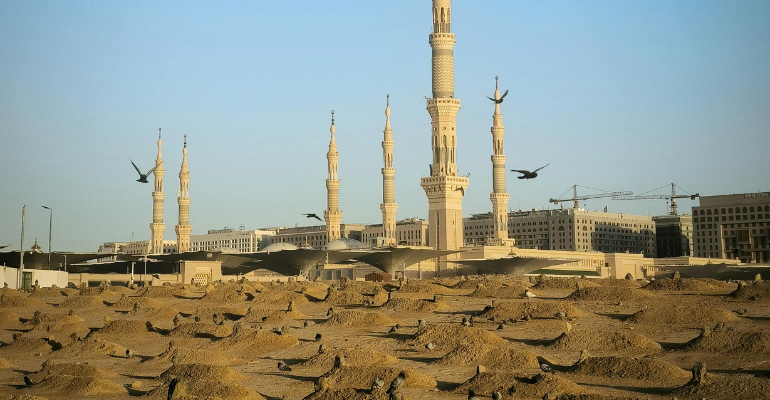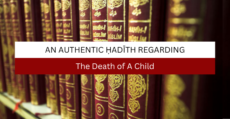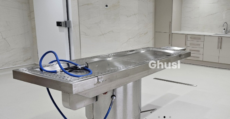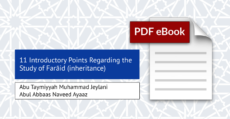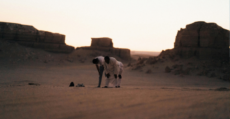Reference: Fatwa #690: https://www.ferkous.app/home/
Question: After the burial of a deceased person, one of the attendees raises his voice when making du’ā, raising his hands, facing the Qiblah, and the people behind him respond with “Āmīn” to his duʿā. What is the ruling on this action? May Allāh bless you.
Response: All praise is due to Allāh, the Lord of the worlds; may salutations of praise and peace be upon the one whom Allāh sent as a mercy to all creation, as well as upon his family, companions, and all those who follow them until the Day of Judgment. Thereafter:
There is no evidence in the pristine sunnah indicating the legislation of raising the voice in duʿā after the burial, raising the hands, and people responding with “Āmīn,” even if their hands are raised towards the Qiblah.
Rather, the established Sunnah is that the Prophet ﷺ, when he completed the burial of the deceased, would stand by the grave and say:
Seek forgiveness for your brother and ask Allāh to grant him firmness, indeed he is now being questioned. [1]
Thus, it suffices for the Sunnī to stand at the graveside and supplicate for the deceased privately, asking for his forgiveness and for him to be granted firmness during questioning. It is permissible for him to repeat the duʿā three times, due to what is known from the Prophet ﷺ, that he would:
Repeat his supplication three times. [2]
It is permissible for a person to encourage others who are present [at the graveyard] to seek forgiveness for the deceased, and to ask Allāh to make him firm due to the aforementioned ḥadīth. However, nothing should be added to this, nor should one seek to “correct” the sharī’ah in any way. Indeed, Allah has perfected this religion and will not take away anything from it; He is pleased with it and will never disprove anything from it.
And knowledge is with Allāh, the most-high; our final call is that all praise is due to Allāh, the Lord of the worlds.
May the salutations of Allāh be upon our Prophet Muḥammad ﷺ, his companions and brothers until the Day of Judgement – and an abundance of peace.
Algeria
1st of Jumādi ath-Thāni, 1428
Corresponding to 17th June, 2007
Footnotes
[1] Narrated by ‘Uthmān; Collected by Abu Dawūd in the Book of Funerals, chapter: Seeking forgiveness near a grave of the deceased during the time of turning away.
[2] Narrated by Ibn Mas’ūd; Collected by Muslim, Book of Jihād and expeditions. Chapter: The harms that the Prophet ﷺ faced from the polytheists and hypocrites.
في رفع الأيدي والتأمين الجماعي في الدعاء للميِّت المقبور
المرجع: http://www.ferkous.com/site/rep/Be11.php
السؤال: عند الفراغ من دفن الميت يرفع أحدُ الحضور صوته بالدعاء رافعًا يديه مُتَّجهًا إلى القِبلة، والناسُ من ورائه يؤمِّنون على دعائه، فما حكم هذا الفعل؟ وبارك الله فيكم.
الجواب: الحمدُ لله ربِّ العالمين، والصلاةُ والسلامُ على مَنْ أرسله اللهُ رحمةً للعالمين، وعلى آله وصَحْبِهِ وإخوانِه إلى يوم الدِّين، أمّا بعد:
فلا يُعْلَمُ في السُّنَّة المطهَّرةِ مشروعيةُ الدعاءِ للميِّت بعد الدَّفنِ بالجهر بالدعاء ورفع الأيدي وتأمين الناس على الدعاء، ولو كانت أيديهم مرفوعةً نحوَ القِبلة.
وإنما السُّنَّةُ الثابتةُ أنه كان صَلَّى اللهُ عليه وآله وسَلَّم إذا فرغ من دفن الميِّت وقف عليه وقال:« اسْتَغْفِرُوا لأَخِيكُمْ، وَاسْأَلُوا اللهَ لَهُ التَّثْبِيتَ، فَإِنَّهُ الآنَ يُسْأَلُ »(1)، فيكتفي السُّنِّيُّ بالوقوف على القبر والدعاءِ له بالتثبيت، والاستغفارِ له على وجه الانفراد، وإذا أعاد دعاءَه ثلاثًا جاز لِمَا عُلِمَ أنّ النبيَّ صَلَّى اللهُ عليه وآله وسَلَّم كان «يُكرِّرُ دُعَاءَهُ ثَلاَثًا »(2)
وله أن يأمر الحاضرين بالاستغفار للميِّت وسؤالِ اللهِ له التثبيتَ للحديث السابق، ولا يزيدُ على ذلك، ولا يستدرك على الشرع؛ لأنّ الله تعالى أكمل دينَه فلا يُنقِصُه، ورضِيَهُ فلا يَسْخَطُهُ أبدًا.
والعلمُ عند اللهِ تعالى، وآخرُ دعوانا أنِ الحمدُ للهِ ربِّ العالمين، وصَلَّى اللهُ على نبيِّنا محمَّدٍ وعلى آله وصحبه
وإخوانِه إلى يوم الدِّين، وسَلَّم تسليمًا.
الجزائر
في: 1 جمادى الثانية 1428ه
الموافق ل: 17 جوان 2007م
__________
1- أخرجه أبو داود في «الجنائز » باب الاستغفار عند القبر للميت في وقت الانصراف :(3221)، والحاكم في «المستدرك »: (1372): والبيهقي في «السنن الكبرى »: (7163)، من حديث عثمان بن عفان رضي الله عنه. وحسنه النووي في «الخلاصة »: (1028/2)، والوادعي في «الصحيح المسند »: (933)، وصححه الألباني في «صحيح الجامع »: (4760).
2- أخرجه مسلم كتاب الجهاد والسير، باب ما لقي النبي صلى الله عليه وآله وسلم من أذى المشركين والمنافقين: (4649)، من حديث ابن مسعود رضي الله عنه

